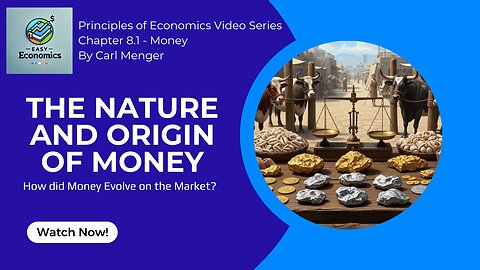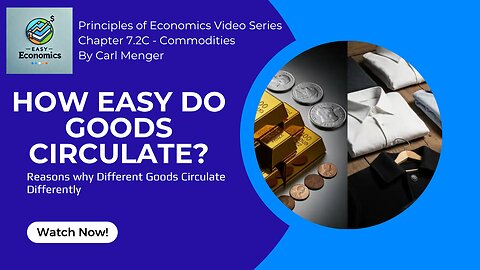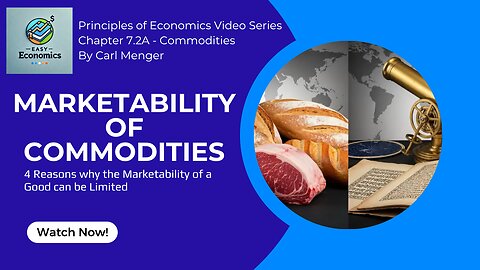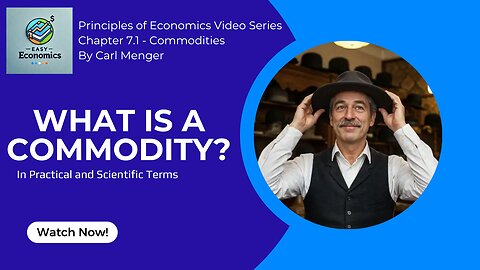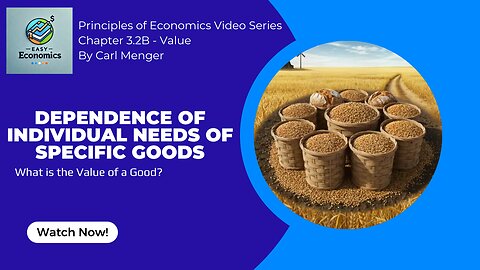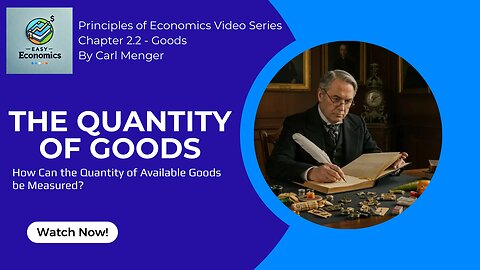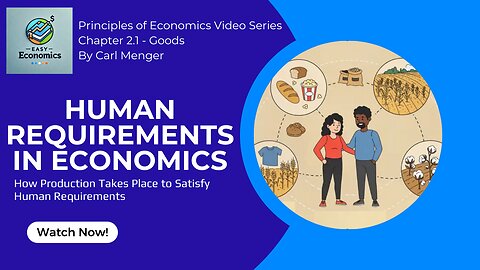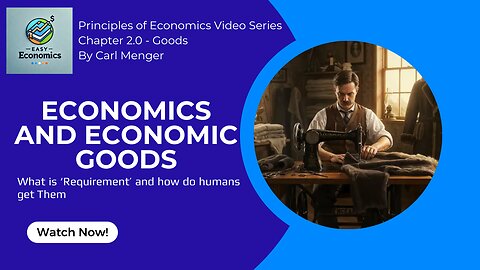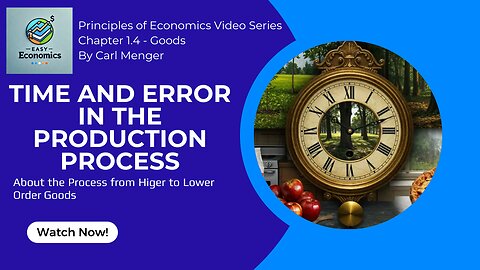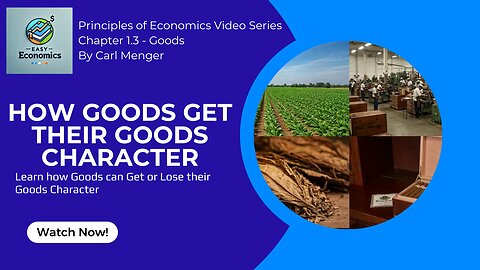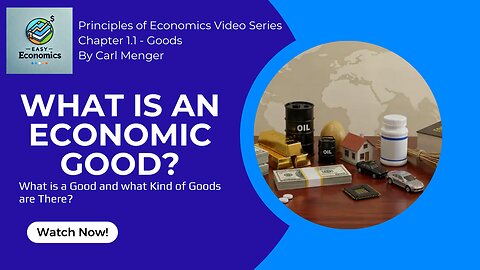Premium Only Content

Principles of Economics by Carl Menger Chapter 8.1 - The Nature and Origin of Money
Principles of Economics by Carl Menger Chapter 7.2C - Circulability of Commodities
Principles of Economics by Carl Menger Chapter 7.2B - Differences in Marketability of Commodities
Principles of Economics by Carl Menger Chapter 7.2A - Marketability of Commodities
Principles of Economics by Carl Menger Chapter 7.1 - What is a Commodity?
Principles of Economics by Carl Menger Chapter 5.3C - Competition Policy
Principles of Economics by Carl Menger Chapter 5.3B - Price Formation by Competing Sellers
Principles of Economics by Carl Menger Chapter 5.3A - Price Forming and Distribution by Competition
Principles of Economics by Carl Menger Chapter 5.2D - Principles of Monopoly Trade
Principles of Economics by Carl Menger Chapter 5.2C - Market Dynamics of Monopoly Pricing
Principles of Economics by Carl Menger Chapter 5.2B - Price Forming in Monopoly Trade for Quantities
Principles of Economics by Carl Menger Chapter 5.2A - Price Formation in Monopoly Trade
Principles of Economics by Carl Menger Chapter 5.1 - Price Formation in Isolated Exchange
Principles of Economics by Carl Menger Chapter 5.0 - The Theory of Price
Principles of Economics by Carl Menger Chapter 4.2 - The Limits of Economic Exchange
Principles of Economics by Carl Menger Chapter 4.1 - Foundations of Economic Exchange
Principles of Economics by Carl Menger Chapter 3.3E - The Value of Land, Labour and Capital
Principles of Economics by Carl Menger Chapter 3.3D - The Value of Individual Higher Order Goods
Principles of Economics by Carl Menger Chapter 3.3C - Combined Value of Higher Order Goods
Principles of Economics by Carl Menger Chapter 3.3B - The Productivity of Capital
Principles of Economics by Carl Menger Chapter 3.3A - What Causes the Value of Higher Order Goods?
Principles of Economics by Carl Menger Chapter 3.2D - The Subjective Nature of the Measure of Value
Principles of Economics by Carl Menger Chapter 3.2C - Influence of the Quality of Goods on Value
Principles of Economics by Carl Menger Chapter 3 2B - The Value of Goods for Individual Needs
Principles of Economics by Carl Menger Chapter 3.2A - Difference in Importance for Individual Needs
Principles of Economics by Carl Menger Chapter 3.1 - The Theory of Value
Principles of Economics by Carl Menger Chapter 2.4 - What is Wealth?
Principles of Economics by Carl Menger Chapter 2.3 - Human Economy and Economic Goods
Principles of Economics by Carl Menger Chapter 2.2 - Available Quantities of Goods
Principles of Economics by Carl Menger Chapter 2.1 - Human Requirements in Economics
Principles of Economics by Carl Menger Chapter 2.0 - Economy and Economic Goods
Principles of Economics by Carl Menger Chapter 1.6 - Ownership of Goods
Principles of Economics by Carl Menger Chapter 1.5 - Causes of Human Prosperity
Principles of Economics by Carl Menger Chapter 1.4 -Time and Error in the Production Process
Principles of Economics by Carl Menger Chapter 1.3 - The Laws that Govern Goods Character
Principles of Economics by Carl Menger Chapter 1.2 - The Causal Connection Between Goods
Principles of Economics by Carl Menger Chapter 1.1 - The Nature of Goods
Principles of Economics by Carl Menger Chapter 1.2 - The Causal Connection Between Goods
You want to read the book? Get it here: https://amzn.to/4cCPIQs
Watch the next video in this series: https://rumble.com/v6s0pvn-principles-of-economics-by-carl-menger-chapter-1.3-the-laws-that-govern-goo.html
Watch the video series from the start: https://rumble.com/playlists/I48mBTB4w2c
Watch our video about Carl Menger: https://rumble.com/v61z0l2-carl-menger-the-father-of-austrian-economics-and-subjective-value.html
What connects wheat fields to your breakfast toast? In this video, we explore the powerful idea of causal chains in economics, as introduced by Carl Menger in Principles of Economics.
Menger explains that real economic understanding begins when we stop viewing goods as isolated items and start examining their causal relationships. Goods aren’t valuable in themselves—they are valuable because they help satisfy human needs, either directly or indirectly. Bread satisfies hunger directly, but things like flour, ovens, or the labor of a baker don’t. Still, these indirect contributors are essential—and they’re goods too.
Menger classifies goods by order:
First-order goods satisfy needs directly (like bread or water).
Second, third, and fourth-order goods include everything that helps produce those direct goods—like grain, tools, or farmland.
This hierarchy of goods doesn’t change their nature. Whether a good is direct or indirect, its economic value comes from its role in a chain of cause and effect leading to need satisfaction.
Understanding this helps us grasp not just what goods are, but how value travels through production, from raw resources to finished products. It’s a concept at the core of Austrian Economics and a key to understanding how economies function on a deep level.
❓ Questions This Video Answers:
-What makes something a good if it doesn’t satisfy a need directly?
-What are goods of the first, second, third, and fourth order?
-How are goods connected in a chain of cause and effect?
-Why is understanding the “order” of goods important in economics?
-How do indirect goods still hold economic value?
00:00 - Introduction to Causal Connections
00:10 - The Importance of Causal Connections
00:26 - Understanding Goods and Their Connections
00:47 - Direct Satisfaction of Needs
01:07 - Goods of the First Order
01:22 - Indirectly Connected Goods
01:44 - Goods of the Second Order
01:56 - Causal Relationship
02:11 - Higher Order Goods and Their Significance
02:26 - The Chain of Causes
02:57 - The Nature of a Good
03:12 - Relating to Human Need
03:39 - Outro
#EconomicValue #GoodsAndNeeds #CarlMenger
-
 3:58:54
3:58:54
SavageJayGatsby
6 hours ago🎃 Friend Friday – Halloween Edition! 👻🕷️
15.5K1 -
 16:16
16:16
Robbi On The Record
12 days ago $16.47 earnedThe Dark History of Halloween | What You Should Know
52.6K45 -
 58:18
58:18
Flyover Conservatives
1 day agoThe Truth About Halloween that You DIDN’T Know - Holiday Special - Historian Bill Federer | FOC SPECIAL Show
30.3K2 -
 3:10:46
3:10:46
Ellie_roe
5 hours agoEllie and Errys Halloween Spooktacular || Random Horror Games
11K -
 50:27
50:27
Sarah Westall
6 hours agoBig Banks Caught Rigging Market, IMF tells World to “Buckle Up” w/ Andy Schectman
25.3K8 -
 13:54
13:54
Degenerate Jay
13 hours ago $0.91 earned5 Best Superhero Movies To Watch On Halloween
11.1K4 -
 59:03
59:03
NAG Podcast
6 hours agoSarah Fields: BOLDTALK W/Angela Belcamino
17.7K6 -
 1:21:41
1:21:41
Glenn Greenwald
9 hours agoGlenn Takes Your Questions: On the Argentina Bailout, Money in Politics, and More | SYSTEM UPDATE #541
76.8K38 -
 3:10:08
3:10:08
Barry Cunningham
6 hours agoPRESIDENT TRUMP TO USE NUCLEAR OPTION? FOOD STAMPS END! | SHUTDOWN DAY 31
45.2K32 -
 1:06:56
1:06:56
BonginoReport
14 hours agoThe Battle Between Good & Evil w/ Demonologist Rick Hansen - Hayley Caronia (Ep.168)
97.9K34
